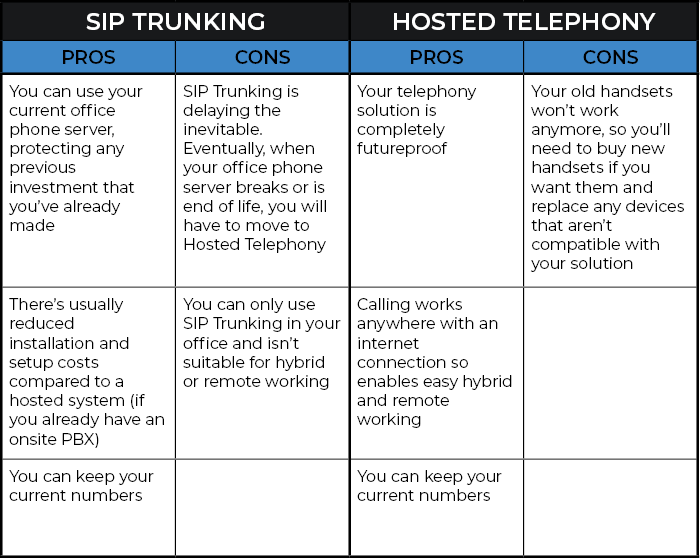the 2025 landline
switch off
Preparing your Business for the Landline Switch Off in 2025
Please note: The Landline Switch Off date has been changed by Openreach from 2025 to 2027. You can read more about the reasons and the date change here.
If you use a landline phone for your business, you may have heard that the technology behind it is changing. ‘The Big Switch Off’, or ‘the Landline Switch Off’, means traditional landlines will be turned off in 2025 and replaced by internet enabled telephony. This is a UK-wide change that will affect all landline users whether they’re businesses or consumers, regardless of their service provider.
But what does this mean for your business? How can you prepare for the Big Switch Off and make sure you don’t lose your phone service? What options are available to you and what are the benefits?
In this article, we will answer these questions and help you get ready for the Big Switch Off in 2025.
Understanding the Big Switch Off
The Big Switch Off will mark the end of both the PSTN – the Public Switched Telephone Network – and the ISDN – the Integrated Services Digital Network. The PSTN relies on copper wires and telephone exchanges for analogue communication. The ISDN was introduced to enhance the PSTN and enables digital transmission of voice data. Together these make up what we know as ‘landline calling’.
Whilst these two systems have been the backbone of the UK’s telecoms infrastructure for decades, they are now outdated. Advances in technology mean that there are now more efficient and cost-effective telephony solutions available, and so both the PSTN and ISDN will be permanently switched off in December 2025.
It’s worth mentioning that although the deadline for the Big Switch Off is December 2025, the phasing out process has been going on for well over a year already. So, if you haven’t already begun preparing, you should start now.
How does the Big Switch Off impact my business?
The Big Switch Off means that if you are using a traditional landline as your business phone system, you will need to move to an internet based phone system instead. Internet enabled telephony is also called IP Telephony. If you’ve ever called someone through a service like WhatsApp or FaceTime, then you’re already experienced in IP Telephony. The only difference is that your business will need a business grade solution rather than consumer grade one.
Remember, if you don’t move to an internet based phone system by the cut off date in December 2025, then you will be left without a telecoms solution. And whilst a full telephony transition can sound daunting, in our experience, as business technology upgrades go, the transition to internet enabled telephony is a relatively straightforward process.
Switch sooner for these reasons
When moving any business system, it’s important to prepare, but in this case there is a time constraint and the sooner you move the better for a number of reasons. Firstly, almost 70% of UK businesses are still using landlines and 45% of organisations are unaware that landlines are being switched off [1]. Because of this, it is likely most organisations will be switching last minute, and so waiting times to transfer numbers will be longer and the whole process will be more time consuming closer to the final switch off date.
Secondly, you want to allow enough time so that you can be sure you’re moving to the right system for your business. You don’t want to rush the decision making process only to realise a few months in that your solution isn’t really suitable.
What telephony options are available to my business?
You can enable IP telephony in two ways: SIP Trunking or a Hosted Phone System. These are both ways to make calls over the internet, but they have some differences in how they are set up and how they work.
SIP Trunking uses something called Session Initiation Protocol to connect your on-site PBX (i.e your phone server in your office) to your internet connection. This way, the SIP Trunk and internet connection work together to allow you to make and recieve calls using your PBX server. This option is only suitable for organisations that already have an onsite PBX server that they want to keep. It’s also worth noting whilst this seems the easy and logical option, you’ll have to change at some point so it’s delaying the inevitable.
A Hosted Phone System is a solution that is based entirely in the Cloud. With Hosted Telephony you can make calls from anywhere, using any device that has an internet connection – Laptop, desktop, mobile or tablet. This option is especially well suited to organisations that have hybrid or remote working environments, or work on multiple devices.

The solution that we recommend and supply is a Hosted Telephony system called TeamsLink that operates natively within Microsoft Teams. You can learn more about it here.
How does the Big Switch Off benefit my business?
A compulsory business system transition can feel frustrating – we get it. But moving to IP Telephony does bring a number of benefits.
- Cost savings. Hosted Telephony doesn’t require a large upfront investment in infrastructure like traditional phones did. Hosted Telephony generally works on a per user per month payment so is scalable and works out cheaper overall. If you choose SIP Trunking, then you’re making the most of the investment you’ve already made by using the onsite equipment you already have.
- Hosted Telephony solutions are much more reliable than traditional phones because they’re Cloud based. If a server in the Cloud has a problem, it will seamlessly move to another server. A good business grade Hosted Telephony system will also include server backup and disaster recovery as standard for extra peace of mind.
- Improved functionality. Landline phones only allowed you to make and receive phone calls. Hosted Telephony solutions are much more comprehensive and include video and voice calls, group calls and conferencing, and rerouting of calls if you’re engaged. They often included sophisticated reporting to help with business intelligence, instant messaging, calendars and integration with your other business systems.
Next steps
We recommend that you research your options and get in touch with a trusted and experienced telephony supplier for advice and support (ahem… like us 😉). Your chosen supplier will do an audit of your current system before designing your new system with you. A proof of concept or trial period is recommended next so you have hands on experience of your new system and the confidence that it is the correct choice for your business. Once you’re happy and any teething problems have been sorted, your supplier will switch you over with very minimal downtime, and your business is ready for the Big Switch Off.
Key Dates
- November 2017. BT Openreach announces The Big Switch Off.
- December 2020. Salisbury Stop Sell. The first area of the UK has a stop sell meaning people in this area can no longer buy new landline services.
- September 2023. UK Wide Stop Sell. Nobody in the UK can buy new landline services. All new telephony system purchases have to be IP enabled.
- December 2025. UK Wide End of Life for landlines, i.e The Big Switch Off.










